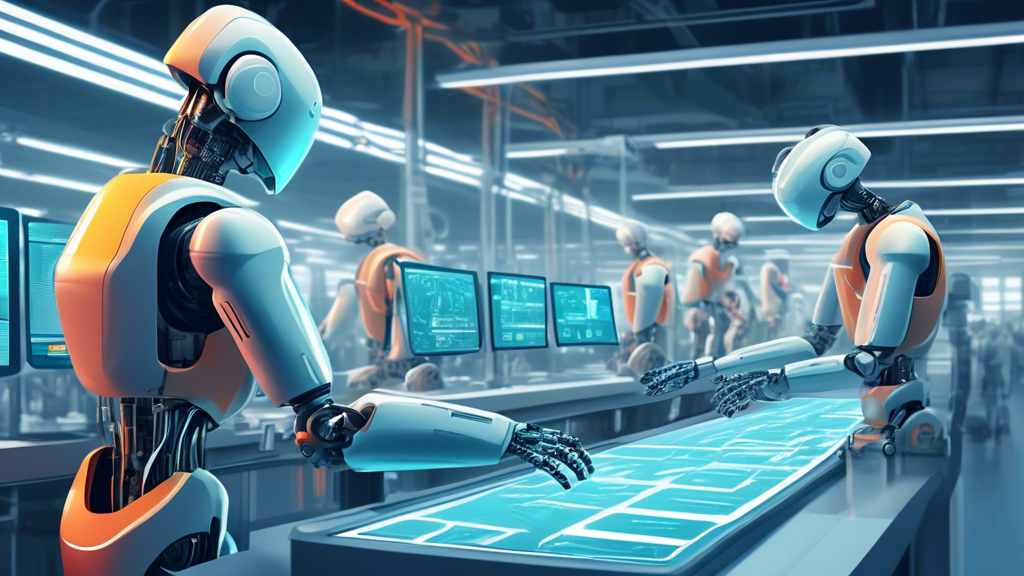Revolutionizing Manufacturing Through Artificial Intelligence
Have you ever wondered how the products you use every day are made? From your morning coffee maker to the car you drive, every component has likely been touched by the hands of Artificial Intelligence at some point in its manufacturing process. The influence of artificial intelligence in the realm of manufacturing is profound, and it continues to grow, bringing with it a wave of transformative changes.
A Personal Anecdote: When Artificial Intelligence Made Its Mark
Let me take you back to my visit to a smartphone manufacturing plant last year. Watching robots and automated systems seamlessly work together was like observing a ballet of steel and wires — each movement meticulously timed and executed. During the tour, I asked the plant supervisor how they managed such precision. His answer? Artificial Intelligence optimizes everything. It wasn’t just about replacing human effort but enhancing capabilities. This firsthand experience made me realize just how integral AI has become in modern manufacturing.
The Rise of Intelligent Machines
Isn’t it intriguing how machines can now predict their maintenance needs or even rectify minor errors during production? AI in manufacturing, often referred to as smart manufacturing, involves the use of complex algorithms and data analytics to improve efficiency, productivity, and reliability. This technology not only accelerates production processes but also improves quality and safety across the board.
Precision and Customization at Scale
One of the standout capabilities of Artificial Intelligence in manufacturing is the ability to produce highly customized products at a scale previously unimaginable. Have you ever ordered a product online with specific, personalized features? AI makes this possible through advanced robotics and machine learning, which allow for rapid changes in production lines to suit individual preferences without sacrificing speed or quality.
Predictive Maintenance: A Game-Changer
Imagine if your machinery could tell you it was going to break down before it happened. With Artificial Intelligence, this is now a reality. Predictive maintenance utilizes AI-driven data analytics to monitor equipment and predict failures before they occur, thus significantly reducing downtime and repair costs. This not only ensures a smoother production line but also extends the lifespan of the machinery.
Enhanced Human-Machine Collaboration
Gone are the days when robots worked in isolation behind safety cages. Artificial Intelligence has fostered a new era where humans and robots collaborate seamlessly. These AI-powered robots can learn from their human counterparts and adapt to different tasks, creating a flexible and responsive manufacturing environment. This synergy not only boosts productivity but also creativity in the manufacturing process.
A Lighter Note: Artificial Intelligence Mishaps and Mix-Ups
Of course, integrating Artificial Intelligence into manufacturing hasn’t been without its humorous mix-ups. Remember the time an AI system misinterpreted a measurement unit conversion, leading to a hilarious production of comically oversized furniture? While these mistakes can be amusing, they also teach valuable lessons about the importance of oversight and continuous refinement of AI systems in manufacturing.
Optimizing Artificial Intelligence
Implementation in Your Manufacturing Operations
To embrace Artificial Intelligence effectively in manufacturing, it’s crucial to invest in quality data and advanced analytics capabilities. Regular training sessions for staff can help bridge the gap between human workers and AI technologies, ensuring that everyone is on the same page. Moreover, staying updated with AI trends and advancements can prepare any manufacturing business for future challenges and opportunities.
Final Thoughts: The Future of Manufacturing with Artificial Intelligence
As we look towards the future, the potential of Artificial Intelligence in manufacturing is limitless. From designing products to final assembly, AI will continue to revolutionize every aspect of the manufacturing process. So, isn’t it thrilling to think about what AI-inspired innovations will come next?
Whether you’re directly involved in the industry or simply a curious observer, the march of Artificial Intelligence in manufacturing is something that impacts us all — transforming the way we think about production, innovation, and the very objects that populate our daily lives.
